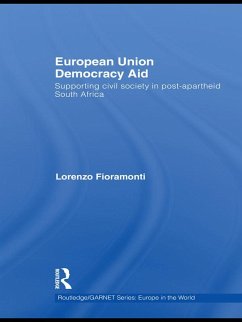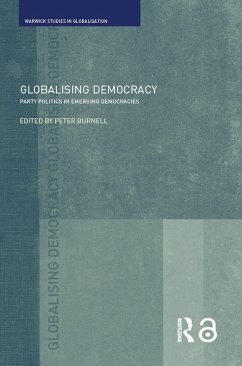
Policy Paper. How to Defeat State Capture through Civil Society Support in Serbia (eBook, PDF)
Sofort per Download lieferbar
Statt: 15,95 €**
13,99 €
inkl. MwSt. und vom Verlag festgesetzt.
**Preis der gedruckten Ausgabe (Broschiertes Buch)
Alle Infos zum eBook verschenkenWeitere Ausgaben:

PAYBACK Punkte
0 °P sammeln!
Academic Paper from the year 2021 in the subject Politics - Region: Eastern Europe, grade: 1,3, , language: English, abstract: Since the fall of the MiloSevic regime in 2000, Serbia has made some progress in its transition to a democratic society. Without pressure from the European Union (EU), many of the required changes would not have happened or would have taken place only very slowly. With the potential of becoming an EU Member State candidate, the EU is a key actor in Serbia's transformation. The EU's strategies for the Western Balkans region are mainly incentive based. Political conditio...
Academic Paper from the year 2021 in the subject Politics - Region: Eastern Europe, grade: 1,3, , language: English, abstract: Since the fall of the MiloSevic regime in 2000, Serbia has made some progress in its transition to a democratic society. Without pressure from the European Union (EU), many of the required changes would not have happened or would have taken place only very slowly. With the potential of becoming an EU Member State candidate, the EU is a key actor in Serbia's transformation. The EU's strategies for the Western Balkans region are mainly incentive based. Political conditionality is considered a key instrument for successful democratization and integration into the Western community of states. The instrument aims to exert a lasting influence on democratization processes with strong incentives such as the prospect of EU membership. It should be understood as linking benefits to the fulfillment of certain conditions intended to contribute to democratization. The most effective form proved to be the conditionality of the Copenhagen criteria for the admission of Eastern European transition countries to the EU. However, the application of the instrument has not been equally successful everywhere and can only be replicated to a limited extent in other regions. "[...] political conditionality also generates reaction, polarization and a sense of injustice in most Western Balkan countries, especially when it touches upon nationally sensitive matters and unresolved post-conflict issues". In Serbia, too, the conditionality approach has so far proved only partially successful. The country is still far from forming a consolidated democracy.According to Freedom House it is currently labeled as a "hybrid regime". Although governance effectiveness has increased under the influence of EU conditionality, the level of democracy has stagnated. Richter und Wunsch are putting "state capture as a key explanatory factor for the observed decoupling between formal compliance and democratic performance in the Western Balkans".
Dieser Download kann aus rechtlichen Gründen nur mit Rechnungsadresse in A, B, BG, CY, CZ, D, DK, EW, E, FIN, F, GR, HR, H, IRL, I, LT, L, LR, M, NL, PL, P, R, S, SLO, SK ausgeliefert werden.













